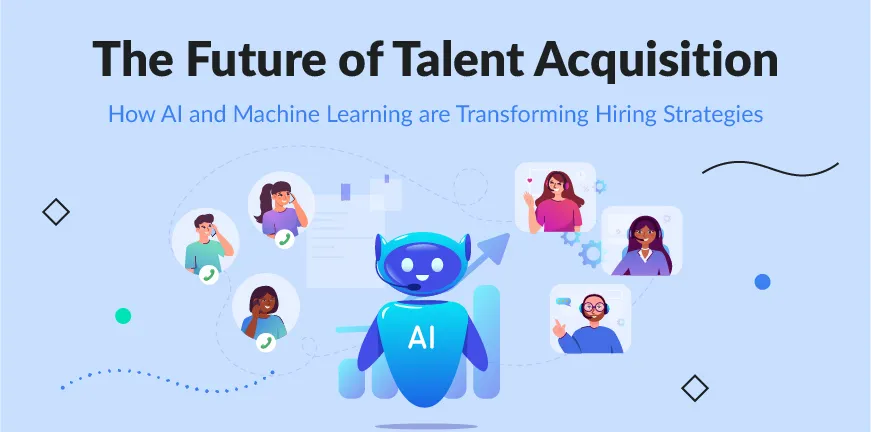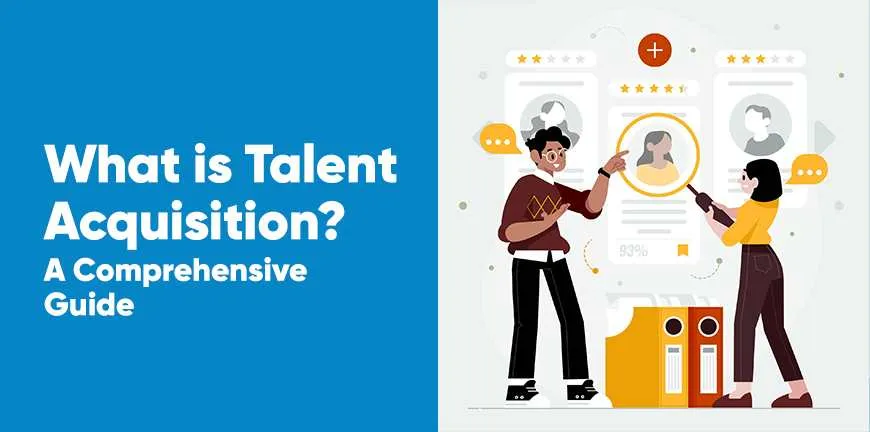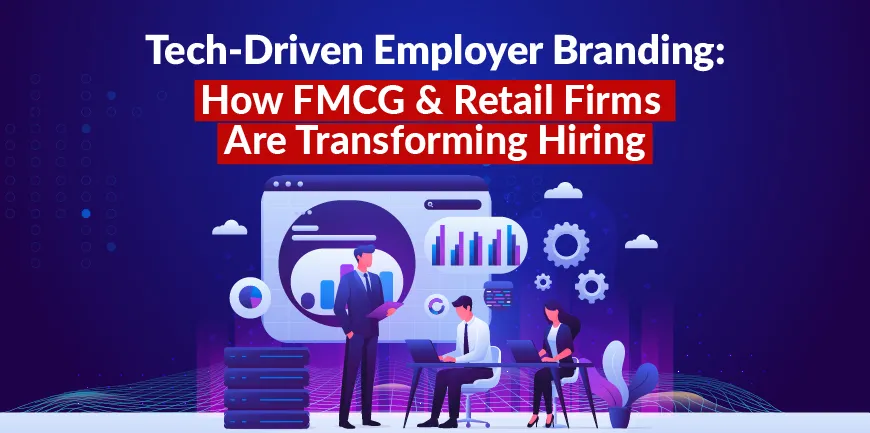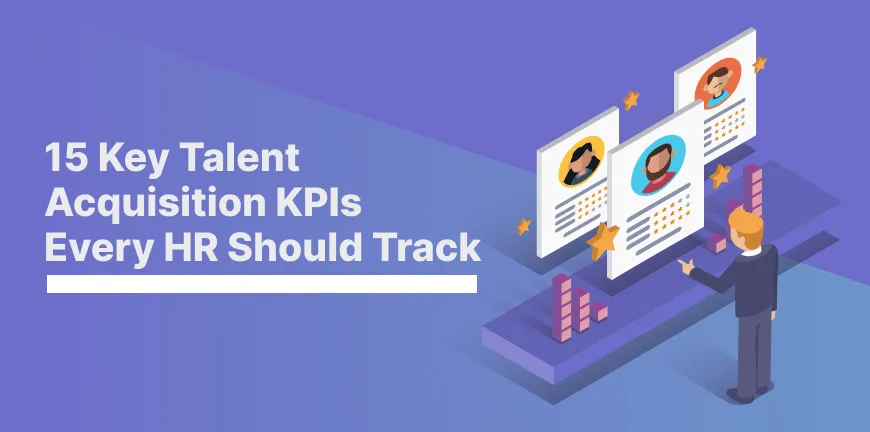
Staff Augmentation Vs Time and Material
06/08/2025
Predictive People Management: Using Workforce Forecasting Tools to Stay Ahead
10/08/2025Jeff Weiner, Former CEO, LinkedIn, said, “AI in recruiting is not about automating people out. It’s about using intelligence to ensure the right person finds the right role at the right time.”
It is mid‑2025, and the talent acquisition environment is undergoing a profound change as AI and machine learning shape its very fabric.
Artificial Intelligence in the global HR market is likely to grow significantly between 2024 and 2025, with a strong compound annual growth rate.
There is a surge in organizations across sectors switching to personalized, morally conscious, and predictive hiring powered by data and modern tools.
This shift is consciously being facilitated as companies are keen on progressing from old-school recruitment strategies.
Are you prepared to stimulate your hiring process by integrating modern tech and AI like never before? Here is how cutting-edge tech redefines recruitment:
1. Smart Resume Screening & Candidate Matching
Modern AI tools and techniques enable reviewing CVs in a whole new light as they not just look at keywords but also focus on context, career graph, and how relevant an individual’s skills are.
This advanced form of matching helps in filtering candidates and ranking them according to best-fit profiles.
This enhances the efficiency of a recruiter and reduces the time taken for recruitment. It is easier for recruiters to interview top talent whose profiles are pre-curated.
According to a survey,43–53% of organizations report a higher quality of hire when they use AI tools
2. AI-Enabled Candidate Search & Outreach
Machine learning systems can spot and recognize passive candidates across channels and specialized platforms.
These advanced systems gather a vast amount of data and, after analysing the behavioural trends, job profiles, and professional associations, the algorithms can precisely identify passive candidates.
They can forecast elements like the interest of candidates in new opportunities based on analytics and signals.
After they are identified, AI tools can personalize outreach methods, designing messages as per the candidate’s professional qualifications, interests, and goals.
3. Predictive Algorithms for Intelligent Hiring
Cutting-edge AI models are becoming an intrinsic part of manpower and recruitment planning.
They can collect huge data and provide input after evaluating them based on factors like industry developments, business growth graphs, skill shortages, etc.
By incorporating advanced systems, AI can anticipate the requirement for talent and when it is needed.
With the help of performance management applications and tools, AI can detect employees who want to leave voluntarily, prompting early intervention, speeding up succession plans.
4. Interviews and Assessments with AI
The interview process is also getting transformed by AI platforms, bringing to the table insights, proficiency, and an objective stance.
The systems are now advanced beyond video recordings; they can now run interviews and evaluate them in real time.
AI can assess the voice tone, posture, eye, and facial expressions, emotional state, communication patterns, etc.
This offers recruiters and business heads a holistic analysis, helping them to determine the correct candidate suitable for their firm.
AI makes a huge difference now as it can also regulate and adjust soft skill evaluations, diminishing unintentional bias and providing recruiters with detailed and well-drafted reports with visual representation.
The reports are substantiated with adequate data that outlines a candidate’s strengths and qualities, enabling recruiters and heads to make meaningful decisions.
5. Super-Personalized Candidate Experience
Candidate experience should be the top priority for recruiters during the hiring process, and AI can help boost the experience with the help of tools that act as assistants to candidates.
The candidates can now interact with the digital platforms 24/7, asking questions, receiving updates, and providing feedback.
There is constant communication, preventing a lag and accelerating the overall experience.
AI chatbots are evolving with enhanced features and can now analyse sentiments and use natural language processing (NLP) to cater to individual patterns of communication.
6. DEI Strengthened by AI
AI tools play a vital role in promoting and empowering a more diverse and inclusive talent acquisition process.
They can help spot and resolve discrimination issues at every step of the hiring funnel, helping organizations foster a fair environment. Smart and exemplary labour force.
AI helps in diminishing possible biases while reviewing resumes by striking out factors that trigger them, like gender, age, ethnicity, etc.
Recruiters can solely focus on the skills, experience, and other relevant aspects.
By incorporating AI in their hiring systems, businesses can, along with creating a fair work landscape can also access a broader and richer talent bank.
Real-world example- Consumer goods conglomerate Unilever uses AI to analyze job descriptions for gender- or culturally biased terms and recommends inclusive language.
7. Internal Role Evolution and Talent Preservation
AI is a revolution that not only affects external recruitment processes but also impacts internal talent management.
It promotes the candidates within organizations. The modern technologies collect huge employee data like behaviour, performance reviews, background, experience, career objectives, etc.
The tools analyse them and match their data to the opportunities available. This ensures that suitable professionals are placed in proper job positions.
It also encourages talent placement that aligns with business goals and future requirements.
8. AI-Backed Hiring Campaigns
Generative AI systems are eventually becoming pivotal in progressive recruitment marketing communication frameworks.
Recruitment teams can now utilize these modern technologies to connect with top-tier candidates.
The tools help in crafting strong, effective, and meaningful messages throughout the recruitment journey.
From impactful job descriptions to outreach emailers, maintaining a particular professional as well as personalized tone and structure.
The systems can establish an appealing brand image and engage candidates efficiently.
9. Intelligent Automation Agents
AI agents it is another new and smart software program influencing the recruitment structure.
They act like assistants who, with the help of AI, can gauge environments. , help in decision-making to attain specific goals.
Use cases:
Vodafone assigns AI agents to screen candidates and schedule interviews automatically. They have now used AI chatbots to interact with over 50,000 candidates.
Loreal uses AI agents (like Mya Systems) for conversational screening and interview scheduling, diminishing early-stage recruiting time by over 30%.
10. Responsible Governance, Regulation, and Faith
As AI becomes the new norm and organizations are incorporating it into their systems, regulatory associations and governments are issuing new and stringent laws and policies.
One of the most significant developments in this case was the European Union’s AI Act, introduced in 2023.
These rulings said that AI-enabled recruitment systems like candidate screening, evaluation tools, and job-matching algorithms are considered “high-risk” applications.
Recruiters and businesses using these tools must ensure regular audits, and AI-driven decisions must be justifiable, traceable, and well-documented.
AI must not be an isolated function; the final call should be taken after careful human evaluation to eradicate any software errors and ensure fair outcomes.
Challenges to Watch Out For
AI is a promising step forward that can boost recruitment processes and drive businesses towards a whole new and improved dimension. However, we must not forget that with new trends come new challenges. Let’s have a look:
Discrimination and Partiality: An unfortunate aspect of AI is that the systems often maintain bias in the training data, enabling discriminatory recruitment practices, legal risks, and damage to brand image.
Intransparency in making decisions: AI tools operate as systems that make decisions without explaining or presenting reasonable facts or reports. Accountability issues crop up due to a dearth of transparency.
Data Privacy Issues: AI tools collect a huge volume of sensitive data that needs to be protected. Organizations using these tools are bound to comply with data privacy laws and rules to safeguard themselves.
Integration hiccups with HR systems: AI integration with HR structures becomes an obstacle as some hr systems are old and outdated, making it difficult for the latest tech to be compatible.
Strategic Future Vision
AI is here to stay; the more we are aware, the more we will be able to accept and embrace. Although challenges look pretty intense, it is not impossible to overcome them.
You must know how to maintain a balance between AI and human judgment. AI can be implemented to manage data, speed intensity, but human intervention is required for the final decisions.
From the beginning, you need to incorporate fair structures ensuring there is availability of diverse data banks, clear policies, explicit consent, and regular bias audits. Another good way to make your HR teams aware is to organize training sessions to make them AI literate.
AI-centric talent acquisition today seems very real and radical. If you, as a business, want to grow and compete with modern tech like many, you have to choose and deploy AI wisely and smartly, trying to blend machine productivity with human involvement, understanding, and control.
Contact Us For Business Enquiry

Neelakantayya Hiremath
Neelakantayya Hiremath serves as the Operations Head – Talent Acquisition at Alp Consulting Ltd., with over 18 years of extensive experience in recruitment operations, workforce strategy, and leadership hiring across technical and non-technical domains. He has successfully led large-scale talent acquisition programs across infrastructure, energy, BFSI, and technology sectors. With deep expertise in RPO delivery, client engagement, and strategic hiring, Neelakantayya drives efficient, business-aligned recruitment solutions that adapt to evolving industry dynamics and organizational goals.




